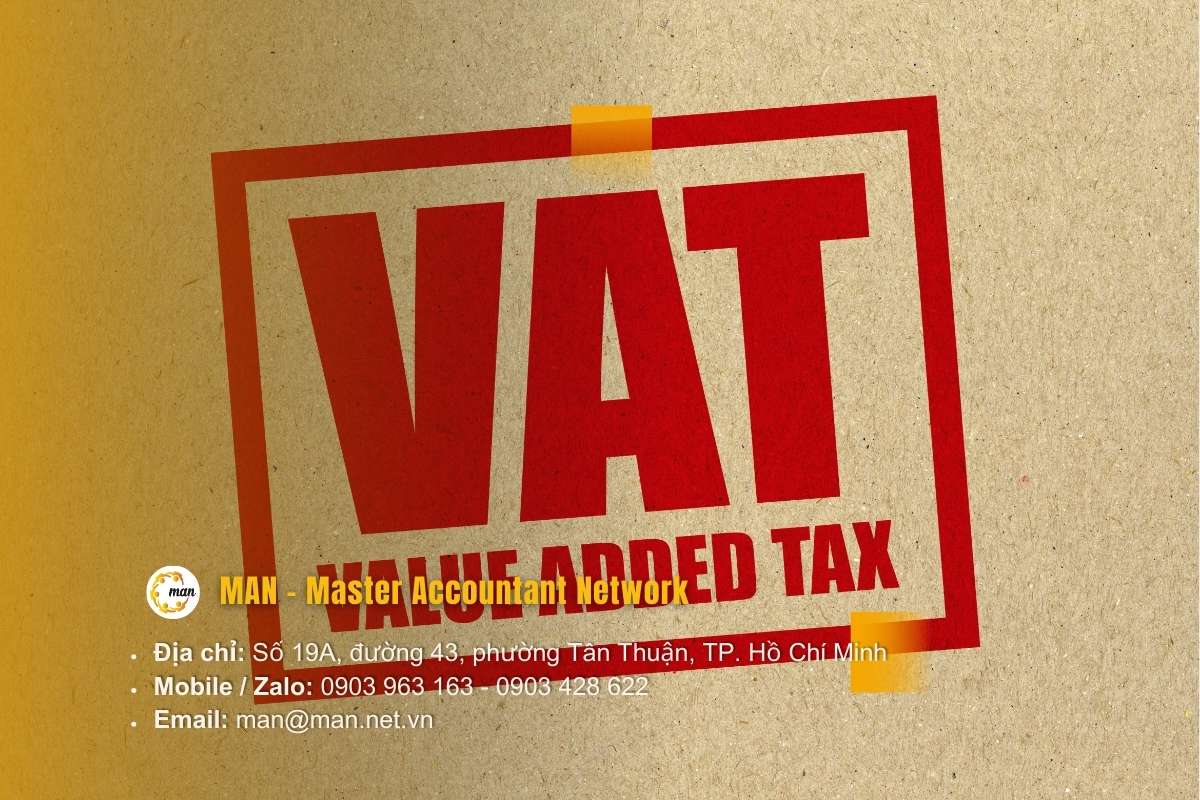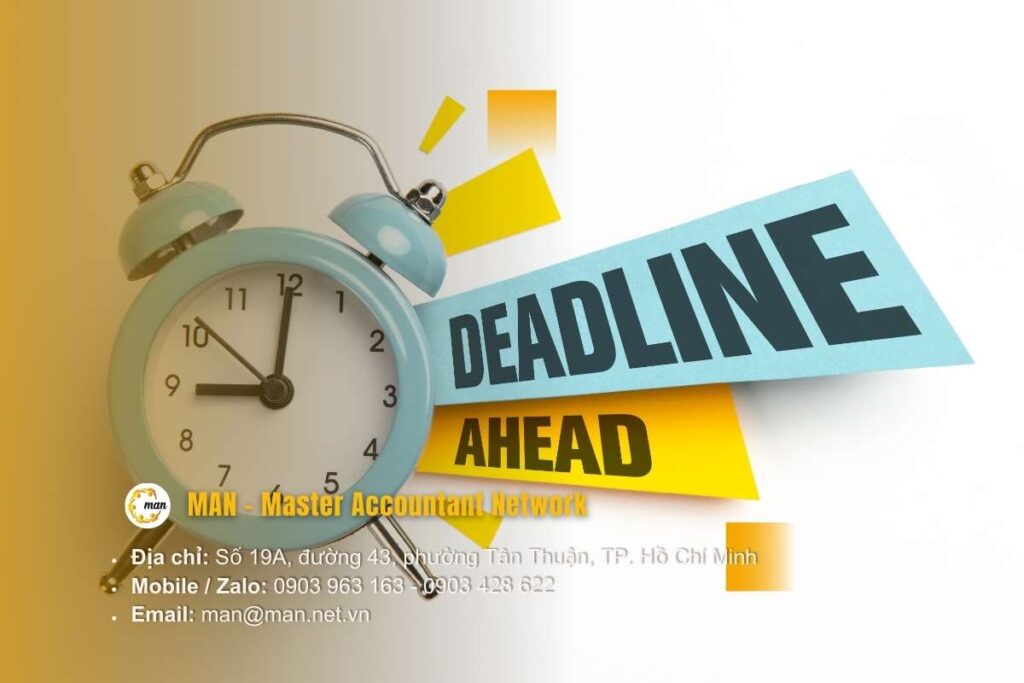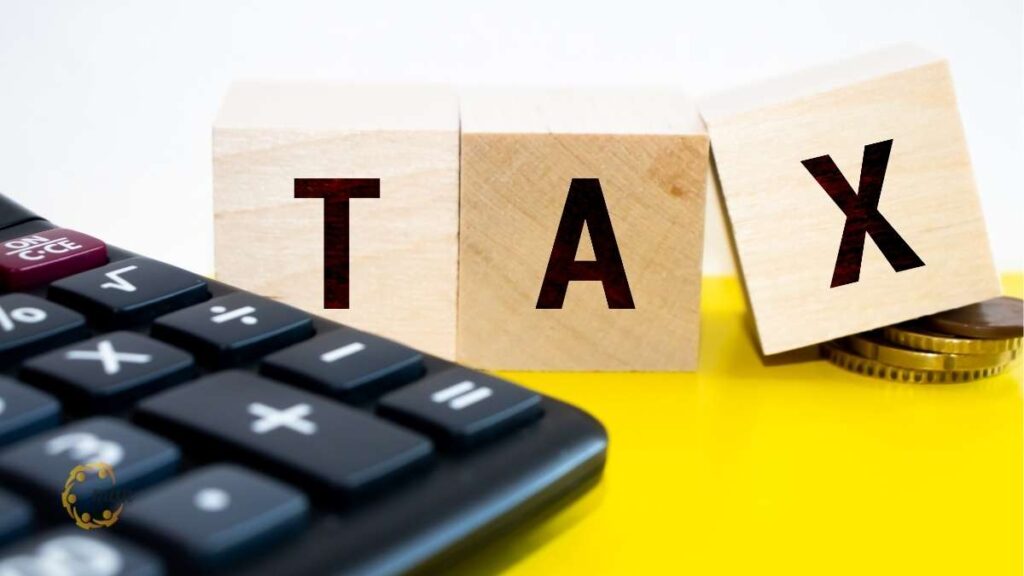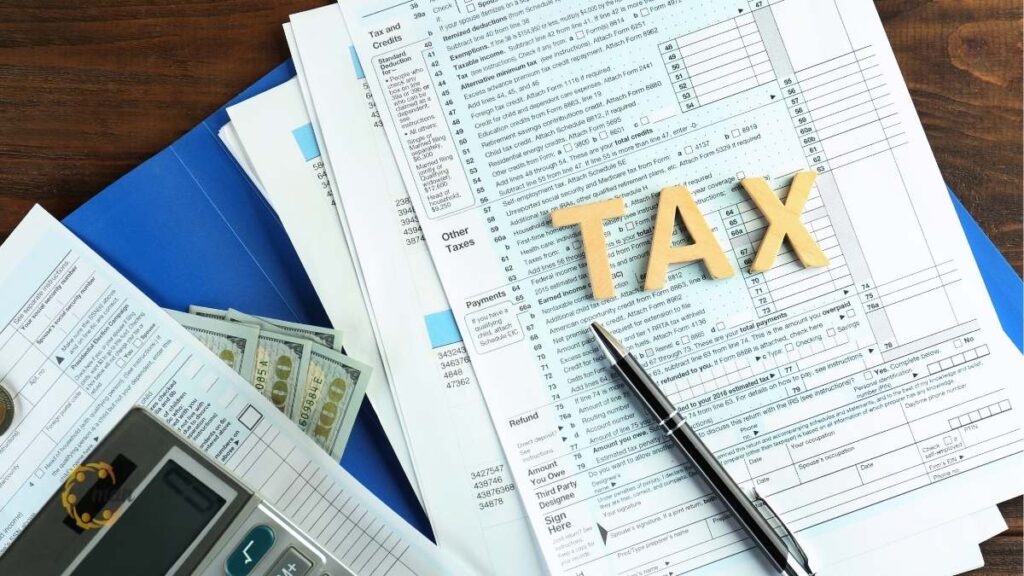The deadline for declaring and deducting VAT is an important milestone that businesses must comply with in 2025. According to the General Department of Taxation, every year tens of thousands of businesses are fined for late payment or incorrect declaration, with fines of up to VND25 million. In the case of a company in Hanoi in 2024, which omitted an invoice worth VND500 million, it lost the right to deduct more than VND50 million in VAT. When the 2024 VAT Law and Decree 181/2025/ND-CP come into effect, the management of electronic invoices and proper implementation of regulations will become more urgent to protect rights.
See more articles at: VAT Overview – MAN
Some concepts related to VAT declaration and deduction time
To master the regulations on VAT declaration and deduction time, businesses first need to clearly understand the related concepts as well as the legal basis for regulation. Accurately determining VAT, deduction mechanism and declaration time not only helps businesses fulfill their tax obligations, but also ensures legitimate rights in business activities.
What is VAT?
“Value added tax is a tax calculated on the added value of goods and services arising in the process from production, circulation to consumption.”
This concept is clearly stated in Law on Value Added Tax 2008, creating an important legal basis for the application and management of VAT in practice.

Value added tax (VAT) currently accounts for a large proportion of state budget revenue and is an effective economic management tool. Understanding the nature of VAT helps businesses grasp the tax calculation mechanism, thereby avoiding errors in declaration and determining financial obligations.
See more articles at: What is VAT? Subjects subject to VAT in 2025
What is VAT deduction?
VAT deduction is a legal mechanism that allows businesses to deduct input VAT (paid when purchasing goods and services) from output VAT (collected when selling goods and services). Thanks to this mechanism, tax is only levied on the added value, helping to:
- Avoid double taxation.
- Reduce cost burden for businesses.
- Ensure fairness among businesses in the same industry.
For example: Enterprise A buys raw materials for VND 110 million (including VND 10 million of input VAT). Then, the enterprise sells finished products for VND 220 million (including VND 20 million of output VAT). When declaring, the enterprise only has to pay VND 10 million of VAT (VND 20 million - VND 10 million).
See more articles at: What is VAT deduction? Some latest related regulations 2025
Legal basis related to time of declaration and deduction of VAT
In current tax management, understanding the legal basis is a key factor for businesses to both comply with their obligations and take advantage of their legal rights. Not only stopping at the concept of tax, the law also specifically stipulates the time for declaring and deducting VAT, ensuring transparency in each tax calculation period.
Law on VAT No. 13/2008/QH12, modified several times and replaced by VAT Law No. 48/2024/QH15 (effective from January 1, 2025), stipulates the principle of determining tax based on added value. At the same time, the law also specifies the tax calculation period by month or quarter, helping businesses accurately determine the time to declare and deduct VAT.

In parallel with the law, the Government issued Decree 181/2025/ND-CP, detailed regulations on VAT declaration and deduction, VAT refund and handling of violations. This is an important legal basis, supporting businesses to comply with the correct time for VAT declaration and deduction, avoiding risks of late penalties or incorrect declaration.
In addition, the Ministry of Finance has issued Circular 219/2013/TT-BTC and many additional documents such as 26/2015, 130/2016, 25/2018. However, when Law 48/2024/QH15 Once effective, these circulars will be replaced by new regulations, ensuring that the legal system is consistent with practical requirements on the time of declaration and deduction of VAT.
It can be seen that the VAT legal system consists of many levels from Laws, Decrees to Circulars. Enterprises need to grasp these regulations to proactively manage taxes, avoid being penalized for errors related to the time of declaration and deduction of VAT, and at the same time ensure their rights when tax refunds arise.
Understanding and applying the legal basis correctly is not only a responsibility, but also helps businesses improve their competitive advantage. Compliance with the correct time for declaring and deducting VAT helps transparent financial management, minimizes risks, and creates prestige in business transactions and with tax authorities.
Deadline for VAT declaration in 2025
To avoid confusion when fulfilling tax obligations, businesses need to clearly understand Deadline for tax declaration and VAT deduction in 2025 is very important. Based on revenue, tax calculation method and operating status, the time for declaring and deducting VAT will be different between large enterprises, small enterprises, newly established units or individual business households. The table below summarizes the detailed deadlines for businesses to easily monitor and comply with regulations.
| OBJECT | DECLARATION PERIOD | VAT DECLARATION DEADLINE | ILLUSTRATIVE EXAMPLE |
| Enterprises with revenue of 50 billion VND or more (previous year) | By month | 20th of next month | VAT for March 2025 must be declared and paid no later than April 20, 2025 |
| Enterprises with revenue under 50 billion VND (previous year) | Quarterly | Last day of the first month of the next quarter | VAT for the first quarter of 2025 must be declared and paid no later than April 30, 2025. |
| New businesses established in 2025 | Quarterly (first 12 months) | Last day of the first month of the next quarter | Enterprises established in February 2025 declare in the first quarter of 2025, deadline for submission is April 30, 2025 |
| Small business organizations and individuals apply direct methods. | Monthly or quarterly depending on subscription | As above, depending on the form of application | If you choose to declare in the second quarter of 2025 → deadline is July 31, 2025 |
Time limit and conditions for input VAT deduction
Input VAT deduction is a mechanism that allows businesses to reduce their tax liability based on the amount of tax paid when purchasing goods and services for business activities. According to VAT Law No. 48/2024/QH15 (effective from January 1, 2025), businesses are only allowed to deduct if they fully meet the conditions and do so within the prescribed time limit. Understanding this regulation not only ensures compliance with the law but also helps businesses optimize legal costs.
Input VAT deduction time
Regarding the deduction period, enterprises are allowed to declare and deduct input VAT in the period of legal invoice issuance. In case of not having time to declare, they are allowed to supplement within the next 6 months from the time of invoice issuance. If this period is exceeded, enterprises will lose the right to deduct and can only account for expenses for corporate income tax calculation. This emphasizes the role of closely monitoring the time of VAT declaration and deduction to avoid loss of rights.
Conditions for input VAT deduction
Regarding deduction conditions, tax authorities require businesses to have:
- Legal VAT invoice (electronic or paper).
- Bank payment vouchers with invoices from 20 million VND or more.
- Goods and services actually used for production and business activities are subject to VAT.
Summary table of time limit and conditions for input VAT deduction
For easy visualization, the table below summarizes the time limit and conditions for input VAT deduction that businesses need to comply with in 2025:
| CONTENT | DETAILED REGULATIONS ON TIME LIMITS AND CONDITIONS FOR INPUT VAT DEDUCTION | PRACTICAL NOTES |
| Deduction period | Declare during the invoice period, or supplement within the next 6 months at most. | Overdue will not be deducted, only corporate income tax expense will be recorded. |
| VAT invoice | Must be electronic/legal invoice with correct information | Carefully check tax code, date of creation, and content of goods and services. |
| Payment documents | Cashless payment with bill ≥ 20 million VND | Transfer via bank, legal e-wallet |
| Intended use | Goods and services used for production and business are subject to VAT. | If used for non-taxable activities → not deductible |
| Special cases | Export of goods and services: must have contract, payment documents, customs declaration | This group is easily disqualified from deduction when the documents lack documents. |
See more articles at: What are Output VAT and Input VAT? New updates in 2025 – VN Tax
VAT declaration and deduction process in 2025
In 2025, compliance with the deadline for VAT declaration and deduction will become a key requirement for all businesses. VAT Law No. 48/2024/QH15 and guiding decrees and circulars have provided detailed regulations to ensure the process of declaration and deduction is transparent and on schedule. If businesses fail to comply with the deadline for VAT declaration and deduction, they may face the risk of being administratively sanctioned or losing the right to deduction.

The process of declaring and deducting VAT in 2025 includes the following steps:
- Collect and check documents: Enterprises collect input and output invoices. Early preparation helps to promptly complete within the deadline for declaring and deducting VAT according to regulations.
- Invoice classification: Check valid and legal invoices to avoid errors when submitting declarations within the deadline for declaration and VAT deduction.
- Output VAT declaration: Determine the VAT amount arising from sold goods and services, prepare monthly or quarterly declarations, ensure no delay in VAT declaration and deduction.
- Input VAT deduction: Enterprises are entitled to input tax deduction if they meet the conditions on invoices, documents and timely declaration and deduction of VAT.
- Submitting declarations and handling differences: After declaring, businesses submit electronic declarations, pay taxes or request tax refunds, all of which must be completed within the deadline for declaring and deducting VAT to avoid risks.
| STEP | CONTENT OF IMPLEMENTATION OF DECLARATION AND DEDUCTION OF VAT DEADLINES | REQUIREMENTS ON DECLARATION AND DEDUCTION OF VAT TIMELINE |
| Collect documents | Collect input and output VAT invoices | Prepare early to submit on time during tax filing period |
| Invoice Classification | Check invoices, remove invalid documents | Complete before the deadline for VAT declaration and deduction |
| Output tax declaration | Prepare monthly/quarterly VAT declaration | Must submit on time to avoid late filing penalty |
| Input tax deduction | Determine the amount of tax eligible for deduction | Valid only if declared within the deadline. |
| Filing & Processing | Submit electronic declaration, pay/refund tax according to results | Strictly comply with the deadline for declaring and deducting VAT |
See more articles at: VAT declaration and payment
Important notes that businesses need to know regarding the deadline for declaring and deducting VAT in 2025
2025 marks a major change when the 2024 VAT Law officially takes effect, so businesses need to pay special attention to the deadline for declaring and deducting VAT to avoid errors in the process of fulfilling tax obligations. Complying with the deadline for declaring and deducting VAT not only helps businesses minimize legal risks but also ensures their rights when receiving tax refunds or input deductions.
First, about the declaration deadline: Enterprises must clearly determine the monthly or quarterly declaration period based on the revenue level. If the deadline for declaring and deducting VAT is not clear, enterprises may pay late, leading to fines and loss of deduction rights during the period.
Second, about the deduction conditions: Valid VAT invoices, bank payments for invoices of VND 20 million or more, and timely declaration and deduction of VAT are prerequisites for tax deduction. If the documents are declared incorrectly or overdue, the right to deduction may be lost, directly affecting business costs.

Third, about invoice management: By 2025, all electronic invoices must be stored, reconciled and declared in accordance with the deadline for VAT declaration and deduction. Errors in invoice management will cause businesses to have their expenses excluded and lose the right to deduction.
Fourth, on technology application: Many accounting software today have the function of automatically warning about the deadline for declaring and deducting VAT, helping businesses avoid delays. Applying technology not only supports timely declaration but also ensures that invoice data is synchronized with tax authorities.
Fifth, on risks and handling: If a business discovers an incorrect declaration, it can still make adjustments, but only within the time limit for declaring and deducting VAT. The longer it takes, the higher the penalty and late payment fee, increasing the financial burden.
Finally, on policy updates: In 2025, the Ministry of Finance and the General Department of Taxation will issue many detailed instructions. Enterprises must regularly monitor to grasp the regulations on VAT declaration and deduction deadlines, avoiding the situation of misapplication of documents.
Penalties for violations of VAT declaration and deduction
According to Decree 125/2020/ND-CP (current) and will be adjusted according to the guidance document VAT Law 2024Compliance with the deadline for declaring and deducting VAT is a mandatory requirement for all businesses. If violated, businesses may be subject to administrative penalties, have deductible tax deducted, or be subject to late payment fees.
| VIOLATIONS RELATED TO DECLARATION AND VAT DEDUCTION TIMELINE | CONTENT OF VIOLATIONS RELATED TO DECLARATION AND VAT DEDUCTION TIMELINE | PENALTY LEVEL | ADDITIONAL CONSEQUENCES |
| Late submission of tax return | Tax declaration dossier submitted after the deadline for declaration and deduction of VAT according to regulations | Fine from 2 - 25 million VND depending on the number of days late | Charged late tax payment fee 0.03%/day |
| False declaration of data | Incorrect information in the declaration does not affect the amount of tax payable | Warning or 1 - 5 million VND | Must be adjusted and supplemented correctly within the deadline for declaring and deducting VAT. |
| False declaration reduces tax liability | Intentionally declaring falsely to reduce tax or increase deductions beyond the deadline for declaring and deducting VAT | Penalty 20% for tax deficiency or incorrect deduction | Collect tax + late payment |
| Improper deduction | Using illegal invoices, not paying via bank or declaring after the deadline for declaring and deducting VAT | Excluded from deduction | No tax refund, may be prosecuted for fraud |
| Failure to file tax return | Failure to submit documents during the entire tax period, beyond the deadline for declaration and deduction of VAT | Fine 15 - 25 million VND | Taxed, lost input tax deduction rights |
Comparison with previous period and new highlights in 2025
To help businesses visualize more clearly the changes in tax policy, especially related to the deadline for declaring and deducting VAT, the table below will compare the regulations for the period before 2025 with the new highlights from 2025 according to: Law on VAT No. 48/2024/QH15 and implementing documents.
| CRITERIA | PERIOD BEFORE 2025 | 2025 (ACORDER LAW 48/2024/QH15 & Decree 181/2025/ND-CP) |
| Legal basis | Law on VAT 2008 (amended and supplemented many times); Circulars 219/2013/TT-BTC, 26/2015/TT-BTC, 130/2016/TT-BTC… | Law on VAT 2024 (effective January 1, 2025); Decree 181/2025/ND-CP; New Circular replacing 219/2013/TT-BTC |
| Deadline for declaration | Monthly or quarterly, depending on revenue (<50 billion VND is declared quarterly). Documents can be submitted in paper or electronic form. | More clearly defined by revenue level, mandatory declaration via electronic system, online data connection with tax authorities. |
| Input VAT deduction | Deductible when having legal invoice and non-cash payment documents with invoice > 20 million VND. | Maintain the principle, but strengthen control through electronic invoices. Deductions are only accepted when the invoice is authenticated on the tax system. |
| Profile Management | Partly manual, data is not synchronized, businesses must keep supporting documents. | Fully managed by electronic invoices, automatic data storage, easy to compare. |
| Penalties for violations of deadlines for declaration and deduction of VAT | Penalties according to the 2006 Tax Administration Law and old penalty decrees. Supervision is mainly after inspection and examination. | Apply the Law on Tax Administration 2019 and Decree 125/2020. Violations are detected immediately thanks to online monitoring, with heavier penalties if the deadline for declaring and deducting VAT is incorrect. |
| Highlights | Semi-manual management, businesses have "flexibility" in the deadline for declaring and deducting VAT. | Comprehensive electronic management, requiring strict compliance with deadlines for VAT declaration and deduction; even small errors are easily detected. |
Conclude
From 01/01/2025, VAT Law No. 48/2024/QH15 officially took effect, marking an important step forward in tax management. Compliance with the deadline for declaring and deducting VAT is not only a legal obligation but also a factor ensuring transparency and reputation in business operations.
Businesses need to regularly update new regulations to avoid confusion when applying old documents that have expired. This helps minimize legal risks and optimize the tax management process.
In addition, businesses must establish a strict process for controlling invoices and documents and storing them scientifically. This is the basis for accounting to easily compare and meet the inspection requirements of tax authorities. At the same time, the accounting department needs to be trained regularly to master the regulations on VAT declaration and deduction deadlines, in accordance with the scale of revenue and tax calculation method of the business.
In the context of increasingly perfect and tightened tax policies, businesses cannot be subjective. Do not let small mistakes cause large costs or legal risks. Contact us immediately. MAN – Master Accountant Network to be consulted, accompanied and ensured to comply with regulations on VAT declaration and deduction in 2025.
Contact information:
- Company: MAN – Master Accountant Network
- Address: No. 19A, Street 43, Tan Thuan Ward, Ho Chi Minh City
- Hotline: 0903 963 163 – 0903 428 622
- E-mail: man@man.net.vn




